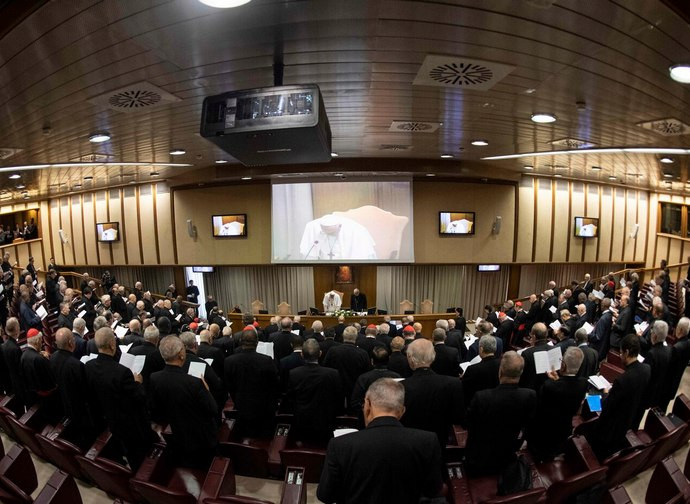Five cardinals with 5 Dubia
The immutable doctrine, blessing of gay unions, nature of the Church, female priesthood, sacrament of reconciliation. This is the text of the first five dubia sent to Pope Francis.

1. Dubium about the claim that we should reinterpret Divine Revelation according to the cultural and anthropological changes in vogue.
After the statements of some Bishops, which have been neither corrected nor retracted, it is asked whether in the Church Divine Revelation should be reinterpreted according to the cultural changes of our time and according to the new anthropological vision that these changes promote; or whether Divine Revelation is binding forever, immutable and therefore not to be contradicted, according to the dictum of the Second Vatican Council, that to God who reveals is due "the obedience of faith"(Dei Verbum 5); that what is revealed for the salvation of all must remain "in their entirety, throughout the ages" and alive, and be "transmitted to all generations" (7); and that the progress of understanding does not imply any change in the truth of things and words, because faith has been "handed on … once and for all" (8), and the Magisterium is not superior to the Word of God, but teaches only what has been handed on (10).
2. Dubium about the claim that the widespread practice of the blessing of same-sex unions would be in accord with Revelation and the Magisterium (CCC 2357).
According to Divine Revelation, confirmed in Sacred Scripture, which the Church "at the divine command with the help of the Holy Spirit, … listens to devotedly, guards it with dedication and expounds it faithfully " (Dei Verbum 10): "In the beginning" God created man in his own image, male and female he created them and blessed them, that they might be fruitful (cf. Gen. 1, 27-28), whereby the Apostle Paul teaches that to deny sexual difference is the consequence of the denial of the Creator (Rom 1, 24-32). It is asked: Can the Church derogate from this "principle," considering it, contrary to what Veritatis Splendor 103 taught, as a mere ideal, and accepting as a "possible good" objectively sinful situations, such as same-sex unions, without betraying revealed doctrine?
3. Dubium about the assertion that synodality is a "constitutive element of the Church" (Apostolic Constitution Episcopalis Communio 6), so that the Church would, by its very nature, be synodal.
Given that the Synod of Bishops does not represent the College of Bishops but is merely a consultative organ of the Pope, since the Bishops, as witnesses of the faith, cannot delegate their confession of the truth, it is asked whether synodality can be the supreme regulative criterion of the permanent government of the Church without distorting her constitutive order willed by her Founder, whereby the supreme and full authority of the Church is exercised both by the Pope by virtue of his office and by the College of Bishops together with its head the Roman Pontiff (Lumen Gentium 22).
4. Dubium about pastors' and theologians' support for the theory that "the theology of the Church has changed" and therefore that priestly ordination can be conferred on women.
After the statements of some prelates, which have been neither corrected nor retracted, according to which, with Vatican II, the theology of the Church and the meaning of the Mass has changed, it is asked whether the dictum of the Second Vatican Council is still valid, that "[the common priesthood of the faithful and the ministerial or hierarchical priesthood] differ essentially and not only in degree" (Lumen Gentium 10) and that presbyters by virtue of the "sacred power of Order, that of offering sacrifice and forgiving sins" (Presbyterorum Ordinis 2), act in the name and in the person of Christ the Mediator, through Whom the spiritual sacrifice of the faithful is made perfect. It is furthermore asked whether the teaching of St. John Paul II's Apostolic Letter Ordinatio Sacerdotalis, which teaches as a truth to be definitively held the impossibility of conferring priestly ordination on women, is still valid, so that this teaching is no longer subject to change nor to the free discussion of pastors or theologians.
5 Dubium about the statement "forgiveness is a human right" and the Holy Father's insistence on the duty to absolve everyone and always, so that repentance would not be a necessary condition for sacramental absolution.
It is asked whether the teaching of the Council of Trent, according to which the contrition of the penitent, which consists in detesting the sin committed with the intention of sinning no more (Session XIV, Chapter IV: DH 1676), is necessary for the validity of sacramental confession, is still in force, so that the priest must postpone absolution when it is clear that this condition is not fulfilled.
Vatican City, 10 July 2023
Walter Card. Brandmüller Raymond Leo Card. Burke
Juan Card. Sandoval Íñiguez Robert Card. Sarah
Joseph Card. Zen Ze-Kiun, S.D.B.
